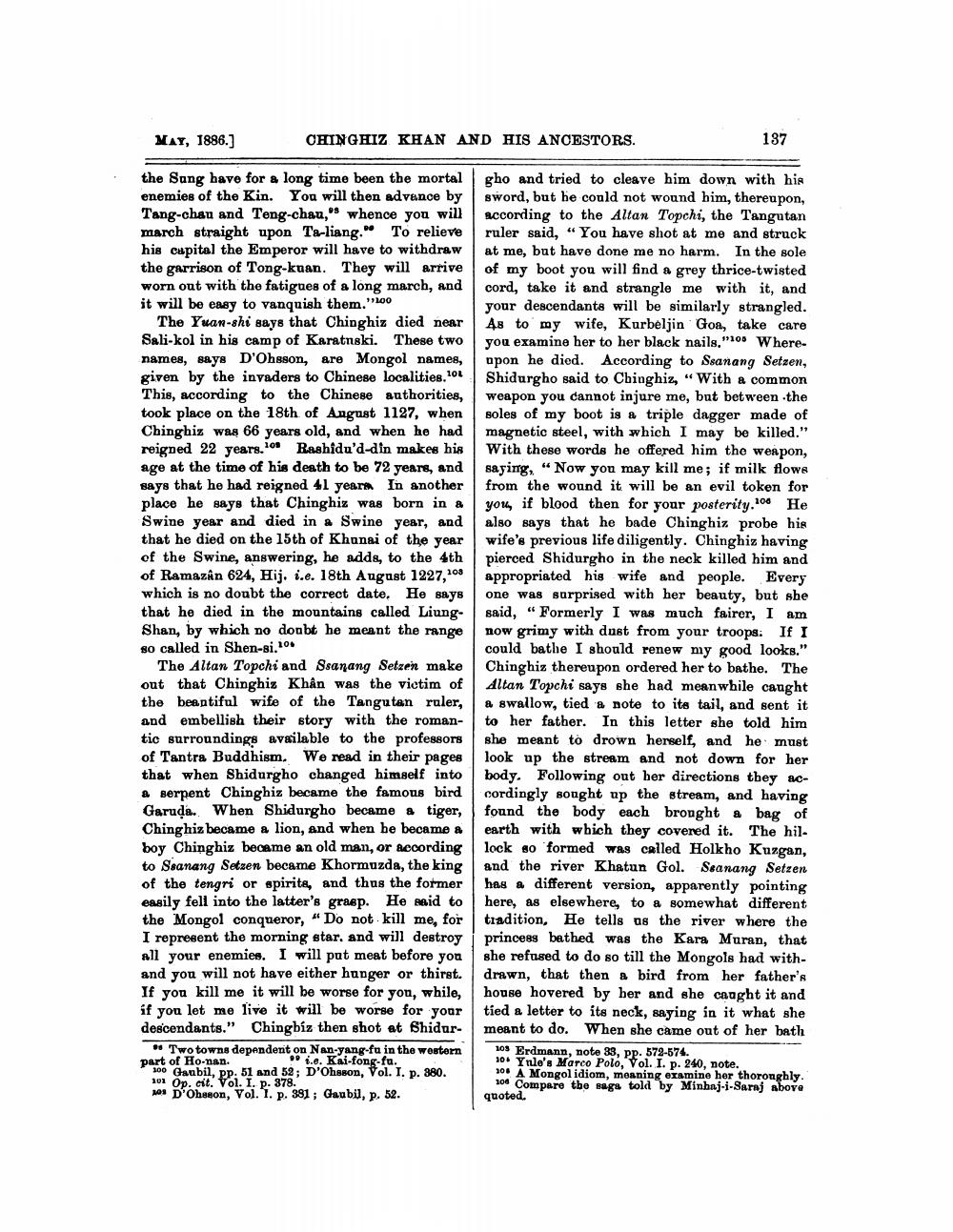________________
MAY, 1886.]
CHINGHIZ KHAN AND HIS ANCESTORS.
137
the Sang have for a long time been the mortal enemies of the Kin. You will then advance by Tang-chan and Teng-chau," whence you will march straight upon Ta-liang." To relieve his capital the Emperor will have to withdraw the garrison of Tong-kuan. They will arrive worn out with the fatigues of a long march, and it will be easy to vanquish them."100
The Yuan-shi says that Chinghiz died near Sali-kol in his camp of Karatnski. These two names, says D'Ohsson, are Mongol names, given by the invaders to Chinese localities.lol This, according to the Chinese authorities, took place on the 18th of Angust 1127, when Chinghiz was 66 years old, and when he had reigned 22 years.101 Rashidu'd-din makes his age at the time of his death to be 72 years, and says that he had reigned 41 years In another place he says that Chinghiz was born in a Swine year and died in a Swine year, and that he died on the 15th of Khonai of the year of the Swine, answering, he adds, to the 4th of Ramazan 624, Hij. i.e. 18th August 1227,105 which is no doubt the correct date. He says that he died in the mountains called LiungShan, by which no doubt he meant the range so called in Shen-si.'
The Altan Topchi and Ssanang Setzen make out that Chinghiz Khân was the victim of the beantiful wife of the Tangutan ruler, and embellish their story with the romantic surroundings available to the professors of Tantra Buddhism. We read in their pages that when Shidurgho changed himself into a serpent Chinghiz became the famous bird Garuda. When Shidurgho became a tiger, Chinghiz became a lion, and when he became a boy Chinghiz became an old man, or According to Ssanang Setzen became Khormuzda, the king of the tengri or spirite, and thus the former easily fell into the latter's grasp. He said to the Mongol conqueror, "Do not kill me, for I represent the morning star. and will destroy all your enemies. I will put meat before you and you will not have either hunger or thirst. If you kill me it will be worse for yon, while, if you let me live it will be worse for your descendants." Chingbíz then shot at Shidur
# Two towns dependent on Nan-yang-fu in the western part of Ho-nan.
" i.e. Kai-fong-fu. 100 Gaubil, pp. 51 and 52; D'Ohsson, Vol. I. p. 880. 101 Op. cit. Vol. I. p. 378. hos D'Ohaeon, Vol. 1. p. 391; Gaubil, p. 52.
gho and tried to cleave him down with his sword, but he could not wound him, thereupon, according to the Altan Topchi, the Tangutan ruler said, “You have shot at me and struck at me, but have done me no harm. In the sole of my boot you will find a grey thrice-twisted cord, take it and strangle me with it, and your descendants will be similarly strangled. 48 to my wife, Kurbeljin Goa, take care you examine her to her black nails."106 Whereupon he died. According to Ssanang Setzen, Shidurgho said to Chinghiz, “With a common weapon you cannot injure me, but between the soles of my boot is a triple dagger made of magnetic steel, with which I may be killed." With these words he offered him the weapon, saying, "Now you may kill me; if milk flowe from the wound it will be an evil token for you, if blood then for your posterity.104 He also says that he bade Chinghiz probe his wife's previous life diligently. Chinghiz having pierced Shidurgho in the neck killed him and appropriated his wife and people. Every one was surprised with her beauty, but she said, "Formerly I was much fairer, I am now grimy with dnst from your troops. If I could bathe I should renew my good looks." Chinghiz thereupon ordered her to bathe. The Altan Topchi says she had meanwhile caught a swallow, tied a note to its tail, and sent it to her father. In this letter she told him she meant to drown herself, and he must look up the stream and not down for her body. Following out her directions they accordingly songht up the stream, and having found the body each bronght a bag of earth with which they covered it. The hil. lock go formed was called Holkho Kuzgan, and the river Khatun Gol. Seanang Setzen has a different version, apparently pointing here, as elsewhere, to a somewhat different tradition. He tells as the river where the princess bathed was the Kara Muran, that she refused to do so till the Mongols had withdrawn, that then a bird from her father's house hovered by her and she caught it and tied a letter to its neck, saying in it what she meant to do. When she came out of her bath
103 Erdmann, note 33, pp. 572-574. 10. Ynlo's Marco Polo, Vol. I. p. 240, note. 306 A Mongol idiom, moaning examine her thorongbly.
100 Compare the sake told by Minhaj-i-Saraj above quoted.




